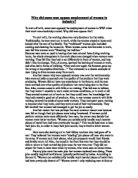Another reason that was perhaps the most common reason was because men felt as though their job places were being threatened. If women could perform various tasks more efficiently than men, the owner may decide that women were better workers. “Women can satisfactorily handle much heavier pieces of metal than had been previously thought.” This would lead men to lose their jobs. So, in order to keep their jobs secure, they strived to drive women away.
Men were also looking out to their fellow workers who had gone off to war. They believed that women were “stealing” job places off men who were in the army. If women took their places, what job prospects would their friends and family return to? Also, the mood in the front line was that they should be able to return to their normal day jobs once the war was over. They did not expect for them to have been taken by women, who were seen as house wives.
Factory jobs were the main jobs that women replaced men doing. These jobs usually required hard labour, typically performed by males. According to Source H, “Women can satisfactorily handle much heavier pieces of metal than had been previously dreamt of.” Women weren’t only replacing men in factory life (though source I states that “women preferred factory life”). Other jobs were now female dominated such as conductors on buses and trams. Women now even tackled the more dangerous jobs such as Air-raid conductors and Fire officers. These jobs men almost had to dominate in order to appear superior and to keep women to housekeeping.
This next point continues on from the “male dominance” theme. Men believed that if women could prove themselves in the workplace, they would get equality with men in society in general. If it was proven that women could handle themselves in the most male dominant places in the country, they could look after themselves in every other male dominant aspect elsewhere. Men were discomforted by this scenario, and strived to keep it male dominant through rather cowardly acts. “My drawer was nailed up by the men…”
Men were also worried over their pay. Men were traditionally paid more than women, so when women came to work in factories, a pay rise for women could be up to half that of the salary for men. If the women could do a satisfactory job for half the pay, the owner may cut the pay rates of men, or sack them and find more women to fill their places. This meant that men would only allow women to work in peace in their workplaces, if they have a full mans wage. This would give them a little bit more job security. “Two shop stewards informed me on the first day that they had no objection to my working there provided I received the full men’s pay rate.”
In the end, it is a very sexist argument. Men believed that women shouldn’t be doing a mans job. They believed that it was more acceptable for women to act as a house wife. This view was shared even by the factory owners themselves. “When the boys come back we are not going to keep you any longer girls.”
So, in conclusion, men had many reasons why they opposed women in the workplace. The main ones were for job security and to keep society male dominant, like it was traditionally. They did not believe in equality as we do today, and this is visibly expressed in Source G. Men were afraid that they would lose their jobs if women proved themselves, and this in turn, would lead to a more female society elsewhere. Men felt as though they had to work incredibly hard to earn their places in the working society, and they did not like the intrusion of women who had very little training and experience. Finally, if women didn’t take over their jobs completely, men were worried about a pay cut if women were working for less. It has been stated in source A, women generally thought they were “very well off earning £5 a week.” This was a massive pay rise compared to the “£2 a month” that women were previously earning.







